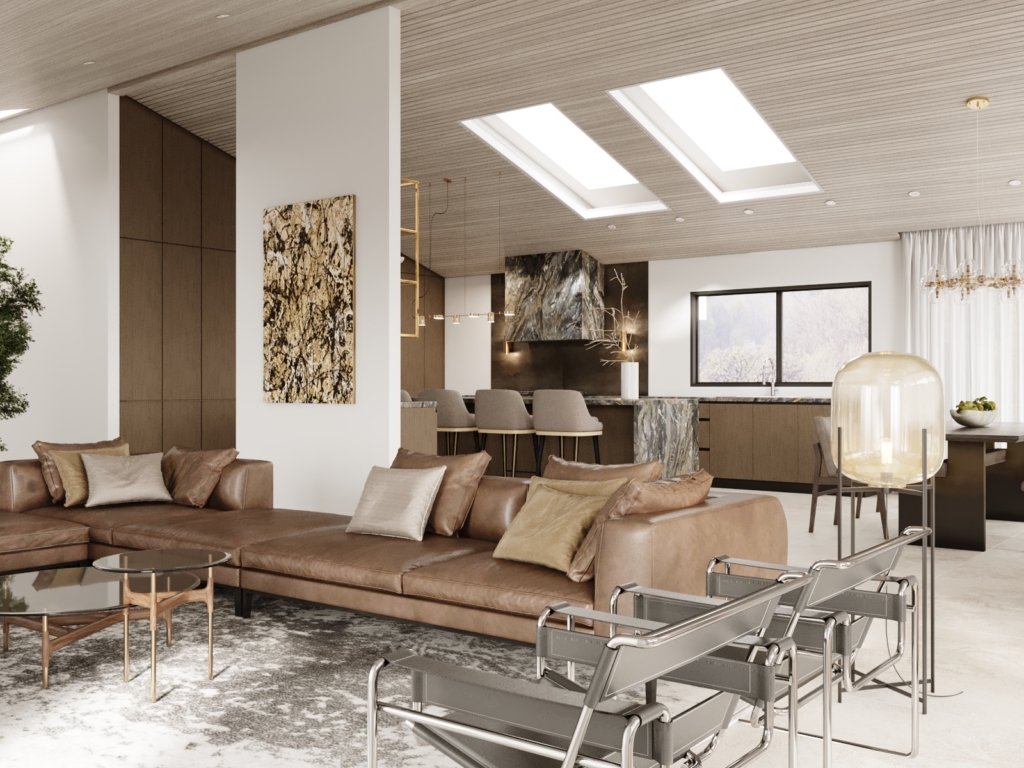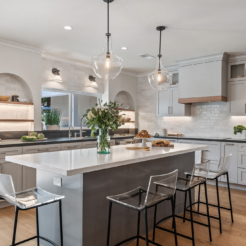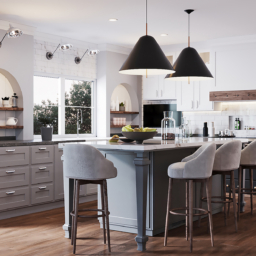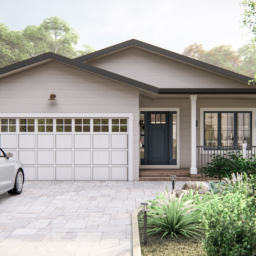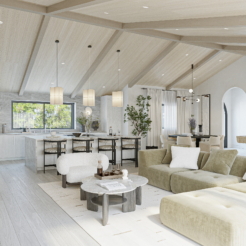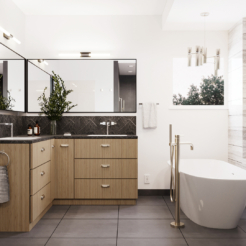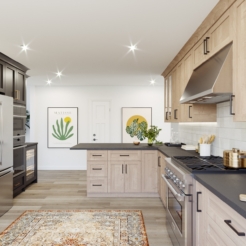Building the custom home of your dreams is an exciting process with endless possibilities. You may have a vision in mind, already decided on your overall style, even selected some of those beautiful finishes – or you may need some guidance from your carefully chosen contractor. But one question remains:
What will it cost to build my custom home?
The process of designing and building a custom home is unique to each client, as unique as the families and specific needs they are built for. Because of this variability, there is no simple answer to this question. Fortunately, there are many common factors that can help you determine the cost to design and build your custom home.
In this article, we’ll guide you through some of the common factors that determine the baseline cost of building your custom home. In addition to explaining square foot pricing, we’ll also discuss:
- Architectural style
- Site conditions
- Details
- Finishes
Price Per Square Foot
While planning a new build or custom home, you’ll often hear the term “price per square foot” when discussing cost. There are quite a few variable elements to consider that go into influencing that price per square foot. A major one being the overall size of the house, but interior and exterior architectural finishes are also factors.
Square foot pricing incorporates costs for:
- Materials
- Subcontractors
- Appliances
- Landscaping
For a home that averages 2,800 sq ft or more, the price per square foot is usually $600 or higher, but that final number depends on all the factors described above.
Architectural Style
The architectural style is one very big factor that will determine your project’s end price. There are many different styles to choose from – a super clean modern look, a traditional style with more classic elements, or maybe you want a more transitional-style home that incorporates both.
The overall complexity of the architectural style will influence the price. Some styles of homes are more structurally complex and have more interior and exterior details to consider, which will potentially cost more. The beautiful, ultra-modern home with clean lines and precise finishes such as recessed baseboards, floating stairs, standing seam metal roof, and custom windows are gorgeous, but come with a (worthy) price tag.
On the other hand, craftsman or more traditional style homes such as craftsman style homes have a great deal of other gorgeous possibilities – intricate door and window casings, stylish custom ceilings, detailed crown moulding, classic wainscot paneling. These beautiful finishes add to the project’s overall cost.
Transitional style homes often have less intricate details and can be a bit more cost-friendly, while still resulting in a beautiful home. Less expensive wood/aluminum clad windows, a composite shingle roof, no high end finishes like wainscoting or crown mounding – limiting these finishes can bring down the cost of labor and custom materials, which can keep your new construction home within budget.
Site Conditions
Beyond the actual home materials, the physical, archeological and geotechnical conditions of the land where you are building can greatly contribute to the overall cost. Two factors that will often come into play are subsurface water and soil composition, both which commonly impact the building site.
Early on in the design & build process, your architect will bring in a geotechnical engineer (otherwise known as a “soils engineer”) that is familiar with local area to evaluate the soil on your building site and made recommendations for modifications. The engineer takes soil samples at depths far below the surface (30-40 ft) to thoroughly analyze and determine groundwater level and soil composition. This is an important step, as it allows the structural engineer and architect make design decisions that will work with the land to protect your home from earthquakes, wind, and other natural events.
What about the soil composition? Getting to know the soil beneath your home can actually greatly impact the overall build. Soil and ground composition findings help the building crew make decisions regarding foundation construction. Certain types of expansive soils (like clay-based soil) can contribute to lifting, cracking and other structural issues that you generally want to avoid at all costs.
One solution for dealing with expansive soil is to excavate all existing soil and refill it with an engineered fill more suitable to building. Drilled piers are another common method used to prevent shifting and contracting of expansive soils. Piers provide additional foundational support, often 16-32” in diameter and reaching 20-32’+ deep. Holes are drilled, reinforced with grade beams and void forms, then filled with concrete. Depending on the size and quantity of piers needed, this method could increase your building costs anywhere from $15,000 to $60,000+.
Subsurface water
If your geotechnical engineer finds subsurface water, that is another costly obstacle. Subsurface water can greatly impact the structural health of your foundation. This is not an unsolvable problem, however – subsurface water can be removed through methods such as dewatering or the placement of secant walls. Secant walls can run up to $200,000 or more, if you have a particularly large basement. Dewatering is less costly, but can still run close to $50,000.
If you do find your home on a site with subsurface water, opting for additional waterproofing in your basement or crawlspace can bring peace of mind, but will also increase that overall price per square foot.
Finishes, Fixtures and Appliances
The beautiful finishing touches really add the wow-factor to your home, and of course, they can also bump up that overall price per square foot. Fixtures, appliances, cabinets, countertops – your final selections play a big role in your ultimate cost.
Finishing touches make your home yours
The options for finishes are seemingly endless, and as with most things, the price varies depending on quantity and quality of materials. Some of the finishes you’ll be choosing include:
– Flooring
– Countertops
– Kitchen cabinets
– Paint
– Fixtures (faucets, cabinet handles, etc.)
Higher quality flooring such a hardwood, tile or concrete can run $15 to $25+ per square foot, depending on the stain or finish. For a more affordable option, linoleum and laminate flooring are both on the lower end of the price spectrum and can still give a beautiful look.
From paint to plumbing fixtures to counter tops and cabinet styles, your designer can walk you through the choices and help you make decisions that will suit your taste while also fitting in your budget.
Appliances increase functionality
Nowadays, appliances do much more than their original purpose. Thanks to modern technology, many luxury appliances come equipped with WiFi, Bluetooth, and can make our daily lives run smoother and more efficiently. Brands like Miele, Sub-Zero, Wolf and Electrolux are a few of the higher end appliance brands available. Choosing top-of-the-line appliances throughout the home add anywhere from $20,000 to $50,000 to a project’s cost. If you’re looking to save, ditching the bells and whistles and selecting appliances that just get the job done is always an option.
In Summary
Hopefully this gives you a better idea about why it is impossible to provide a “one size fits all” cost projection for a custom home build. Building your own home gives you the opportunity to create a unique home that perfectly suits your family’s needs and style. Depending on these factors, this price can vary greatly. Keeping “price per square foot” in mind as you are discussing your project with your design & build team will help you understand the baseline estimate and projected cost as time goes on.
It also helps to have a trustworthy contractor who will keep you in the loop every step of the way and discuss things with you in a way you understand.
If you’re ready to start building your custom dream home, schedule a free consultation with HomeTech. Our expert team would love to discuss your home project and make your vision a reality. Call 408-542-0833 to schedule your free consultation today. Or, fill out the form below and we’ll get in touch!




